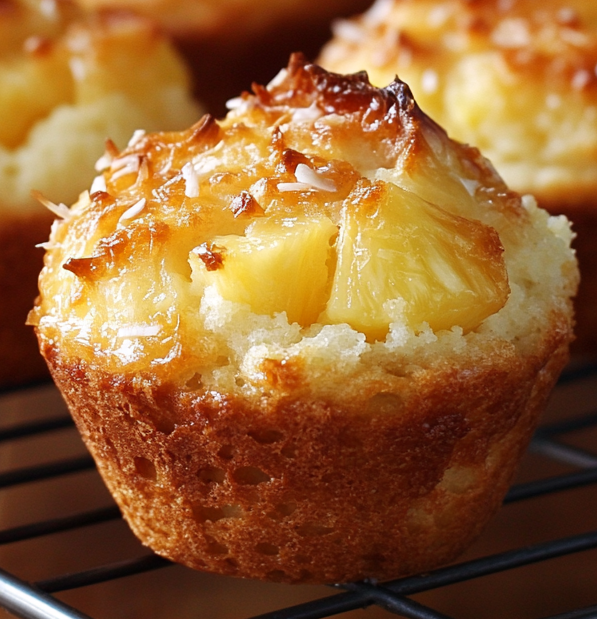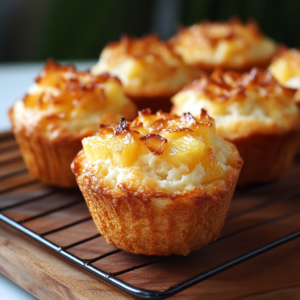Have you ever bitten into a muffin that was not only delicious but also left you feeling good about your food choices? That’s exactly what these Healthy Coconut and Pineapple Cottage Cheese Muffins do! These moist, tropical-flavored treats have become my family’s favorite breakfast and snack option, combining the indulgence of a traditional muffin with nutrition that actually fuels your day.
I discovered this recipe during a phase when I was trying to increase protein in my family’s diet without relying on processed protein powders. The secret ingredient – cottage cheese – might raise eyebrows, but trust me: you won’t taste it in the final product. Instead, it creates an incredibly moist texture while boosting the protein content substantially.
With the bright flavors of pineapple and coconut, these muffins transport you to a tropical paradise with every bite. They’re perfect for busy mornings, lunchbox treats, or a healthy afternoon pick-me-up. Best of all? My kids absolutely love them, and they have no idea they’re packed with nutrition!
Why You’ll Fall in Love With These Healthy Muffins
Before diving into the recipe, let me share why these Healthy Coconut and Pineapple Cottage Cheese Muffins deserve a spot in your regular baking rotation:
- Protein-packed: Each muffin contains approximately 7-8 grams of protein, making them truly satisfying
- Actually healthy: Unlike store-bought muffins that are essentially cupcakes in disguise, these contain wholesome ingredients
- Kid-approved: The tropical flavors appeal to children while the natural sweetness satisfies without sugar crashes
- Meal-prep friendly: They freeze beautifully for grab-and-go breakfasts and snacks
- Versatile: Easy to adapt based on dietary needs or what’s in your pantry
- No weird aftertaste: Unlike many “healthy” baked goods, these taste like a genuine treat
I’ve been making these muffins for about five years now, and they’ve become such a staple that my family notices if a week goes by without them. Let me share this game-changing recipe with you!
Ingredients You’ll Need
Dry Ingredients:
- 1½ cups whole wheat pastry flour (or white whole wheat flour)
- ½ cup old-fashioned rolled oats
- ⅓ cup unsweetened shredded coconut, plus 2 tablespoons for topping
- 2 teaspoons baking powder
- ½ teaspoon baking soda
- ¼ teaspoon salt
- 1 teaspoon ground cinnamon
- ¼ teaspoon ground nutmeg (freshly grated if possible)
Wet Ingredients:
- 1 cup low-fat cottage cheese (2% works best)
- 2 large eggs, at room temperature
- ¼ cup plain Greek yogurt (2% or full-fat recommended)
- ¼ cup honey or pure maple syrup
- 3 tablespoons coconut oil, melted and slightly cooled
- 1 teaspoon pure vanilla extract
- ½ teaspoon coconut extract (optional but recommended for deeper coconut flavor)
Mix-ins and Toppings:
- 1 cup fresh or canned pineapple chunks, drained well and chopped into small pieces
- ¼ cup chopped pecans or walnuts (optional)
- 2 tablespoons unsweetened coconut flakes for topping
Equipment Needed
These muffins come together easily with basic kitchen equipment:
- Standard 12-cup muffin tin
- Paper muffin liners or cooking spray
- Two mixing bowls (one large, one medium)
- Measuring cups and spoons
- Wooden spoon or silicone spatula
- Wire cooling rack
Step-by-Step Instructions
Preparation (10 minutes)
- Preheat your oven to 350°F (175°C). Line a 12-cup muffin tin with paper liners or spray with cooking spray.
- Prepare the pineapple: If using canned pineapple, drain thoroughly and pat dry with paper towels to remove excess moisture. Chop into small pieces about ¼-inch in size. If using fresh pineapple, peel, core, and chop into similar-sized pieces.
- Bring refrigerated ingredients to room temperature: This helps them incorporate more smoothly. If you forgot to do this ahead of time, place the eggs in a bowl of warm water for 5 minutes to take the chill off.
Mixing the Batter (15 minutes)
- Combine dry ingredients: In a large bowl, whisk together the whole wheat pastry flour, rolled oats, ⅓ cup shredded coconut, baking powder, baking soda, salt, cinnamon, and nutmeg. Create a well in the center for the wet ingredients.
- Blend the wet ingredients: In a separate medium bowl, combine the cottage cheese, eggs, Greek yogurt, honey or maple syrup, melted coconut oil, vanilla extract, and coconut extract (if using). I recommend using a blender or food processor for this step to create a smooth mixture without cottage cheese lumps, but whisking vigorously by hand works too.
- Combine wet and dry mixtures: Pour the wet ingredients into the well in the dry ingredients. Gently fold together using a wooden spoon or spatula, stirring just until combined. The batter will be thick. Baker’s tip: Overmixing develops gluten, which creates tough muffins. Stop stirring as soon as no dry flour is visible.
- Fold in mix-ins: Gently fold in the chopped pineapple and nuts (if using), being careful not to overmix. Some streaks of flour are actually preferable to overmixed batter.
Baking (20-25 minutes)
- Fill the muffin cups: Divide the batter evenly among the 12 muffin cups. They should be about ¾ full. I find an ice cream scoop works perfectly for this.
- Add toppings: Sprinkle the remaining 2 tablespoons of coconut flakes over the tops of the muffins.
- Bake to perfection: Place in the preheated oven and bake for 20-25 minutes, or until the tops are golden brown and a toothpick inserted into the center comes out clean or with just a few moist crumbs.
- Cool properly: Allow the muffins to cool in the tin for 5 minutes, then transfer to a wire rack to cool completely. This step is important as the muffins continue to set as they cool.
Storage and Make-Ahead Tips
These muffins are perfect for meal prep and actually taste even better the next day as the flavors meld:
- Room temperature: Store in an airtight container at room temperature for up to 2 days. The moisture from the cottage cheese and pineapple helps them stay fresh.
- Refrigerator: For longer storage, keep in the refrigerator for up to 5 days. I recommend warming slightly before eating for the best texture.
- Freezer: These freeze beautifully! Wrap individual muffins in plastic wrap, then place in a freezer bag. They’ll keep for up to 3 months. Thaw overnight in the refrigerator or defrost in the microwave for a quick breakfast.
- Make ahead option: Prepare the batter the night before, cover and refrigerate, then bake fresh in the morning. You may need to add 2-3 minutes to the baking time if the batter is cold.
Nutritional Benefits
What makes these muffins truly special is their impressive nutritional profile:
- High protein: Thanks to the cottage cheese, eggs, and Greek yogurt
- Fiber-rich: From whole wheat flour and oats
- Healthy fats: Provided by coconut oil and optional nuts
- Lower in sugar: Contains significantly less sugar than traditional muffins
- Good source of calcium: From the dairy ingredients
- Natural energy: Complex carbohydrates provide sustained energy rather than a quick sugar rush
Approximate Nutritional Information (per muffin):
- Calories: 180-200
- Protein: 7-8g
- Carbohydrates: 23-25g
- Fiber: 3-4g
- Fat: 8-9g (mostly healthy fats)
- Sugar: 9-10g (mostly from natural sources)
Common Questions and Troubleshooting
Q: Can I taste the cottage cheese in these muffins? A: Not at all! When blended with the other ingredients, cottage cheese simply adds moisture and protein without any distinct flavor. Even cottage cheese skeptics love these muffins.
Q: Can I make these gluten-free? A: Absolutely! Simply substitute a 1:1 gluten-free flour blend for the whole wheat flour and ensure your oats are certified gluten-free. The texture may be slightly different but still delicious.
Q: My muffins came out dense. What went wrong? A: The most common causes are overmixing the batter or using cold ingredients. Remember to fold gently just until combined and bring refrigerated ingredients to room temperature before starting.
Q: How can I make these dairy-free? A: While cottage cheese is key to this recipe, you can experiment with dairy-free alternatives. Try silken tofu blended with a touch of lemon juice as a cottage cheese substitute, and use coconut yogurt instead of Greek yogurt.
Q: Can I use frozen pineapple? A: Yes, but thaw it completely and drain very well, then pat dry with paper towels to remove excess moisture which could make your muffins soggy.
Delicious Variations to Try
Once you’ve mastered the basic recipe, here are some tasty ways to mix it up:
Tropical Paradise Version
Add ¼ cup chopped dried mango and substitute macadamia nuts for the pecans/walnuts for an even more tropical flavor profile.
Berry Coconut Twist
Replace the pineapple with 1 cup of fresh or frozen blueberries or raspberries (if using frozen, do not thaw first to prevent color bleeding).
Zucchini Coconut
Add 1 cup of shredded zucchini (well drained) for extra moisture and veggies. This version is particularly good with walnuts.
Banana Coconut
Substitute very ripe mashed banana for half of the pineapple for a different tropical flavor combination. Add a few dark chocolate chips for an indulgent twist.
Chai-Spiced
Double the cinnamon and add ¼ teaspoon each of ground cardamom, ginger, and cloves for a chai-inspired flavor profile that pairs beautifully with the coconut.
Serving Suggestions
While these muffins are delicious on their own, here are some ways to enjoy them:
- Breakfast pairing: Serve with Greek yogurt and fresh fruit for a complete, balanced breakfast
- Spread options: Try a thin layer of almond butter or a dollop of Greek yogurt sweetened with a touch of honey
- Afternoon tea: Pair with a cup of coconut or pineapple flavored tea for an afternoon treat
- Lunchbox star: Pack alongside a protein source and fruit for a nutritionally balanced lunch
- Dessert transformation: Warm slightly and top with a small scoop of coconut ice cream for a healthier dessert option
Why This Recipe Works
The science behind these muffins explains their incredible texture and staying power:
- Cottage cheese’s dual role: The protein in cottage cheese creates structure while the moisture keeps the muffins tender
- Balanced leavening: Both baking powder and baking soda ensure proper rise despite the heavy, moist ingredients
- Whole grains + protein: This combination slows digestion, providing sustained energy rather than a quick spike and crash
- Natural tenderizers: The acids in pineapple and yogurt tenderize the gluten in the flour, preventing toughness
- Fat distribution: Melted coconut oil coats the flour particles, limiting gluten development and creating tender crumb
From My Family to Yours
These Healthy Coconut and Pineapple Cottage Cheese Muffins have become a cornerstone recipe in our home. My children request them for breakfasts before big tests, my husband grabs one on his way to early meetings, and I enjoy them with afternoon tea when I need a little pick-me-up.
What I love most is watching guests’ surprise when I tell them these delicious muffins are actually nutritious too. There’s something deeply satisfying about creating food that nourishes both body and soul – and these muffins do exactly that.
Whether you’re a seasoned baker or just starting out, these forgiving, flexible muffins are sure to become a staple in your kitchen. They’re proof that healthy eating doesn’t mean sacrificing flavor or the simple joy of a freshly baked treat.
Happy baking, and enjoy your tropical muffin getaway!

